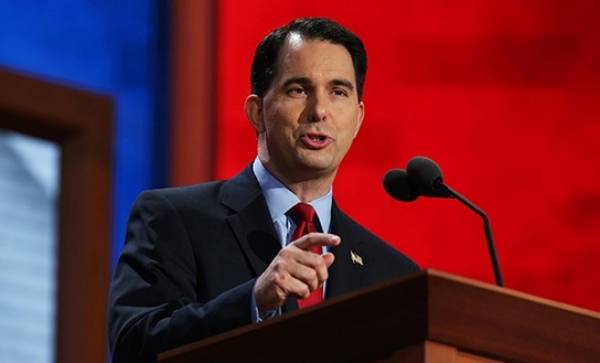Presidential Candidate Scott Walker a Hypocrite on Gambling

When it comes to gambling, Wisconsin governor and Republican Presidential candidate Scott Walker can be described in one word.
Hypocrite.
As in, say one thing and do another.
Or more specifically, as in speaking out against political donations from casino interests, but then accepting political donations from those same casino interests.
As one of the early leaders in the polls for the 2016 Republican Presidential nomination, Walker, 47, now in his second term as governor, is a name to be watched.
Especially since he hails from a state that borders Iowa, the site of the nation's critical first Presidential contest of 2016, the Iowa Caucus, and Iowa voters love to vote for their neighbors.
But if honesty and integrity are key characteristics that voters look for in a potential U.S. President, then Walker, when it comes to the subject of gambling, has crapped out.
Let's examine the record:
Walker started his political career as a state legislator, getting elected to the Wisconsin State Assembly, the lower house of state government, in 1993, and being re-elected four times.
He was elected governor of Wisconsin in 2010, survived a recall election in 2012 and was re-elected in 2014.
In 1997, as a state legislator, he introduced a bill into the State Assembly that prohibited any political candidate or political committee from accepting “a political contribution made by any person who owns, operates or manages a casino or racetrack in any state, or who is licensed by any state to operate or manage a casino or racetrack."
The bill failed.
But after Democratic governors were elected in Alabama and South Carolina in 1998, partly on the strength of large political donations from gambling interests, Walker in 1999 re-introduced his bill, and even issued a press release touting its merits.
That '99 press release, which can be seen at Think Progress, a political website that broke the story of the hypocrisy, quoted Walker as saying: "We have seen problems with gambling money at the Federal level and in other states. This measure will help prevent such problems here in Wisconsin. Gambling interests want to expand into new locations all over Wisconsin. We must act now before problems evolve in this state."
The bill failed again.
When Walker unsuccessfully ran for governor in 2006, he didn't accept any political donations from gambling interests, nor did he when he successfully ran for governor in 2010.
But then in 2012, after Walker was involved in a controversy over state union workers, voters tried to remove him from office, in a so-called recall election.
And it was in that 2012 gubernatorial recall campaign, records show, that Walker accepted a $250,000 donation from casino mogul Sheldon Adelson, who is chairman and chief executive officer of Las Vegas Sands Corp., a Nevada company that owns and operates casinos in Nevada, Pennsylvania, China and Singapore.
Records also show that Walker also received a $4,000 donation from the Forest County Potawatomi Community, an Indian tribe that operates a casino in Milwaukee, a $2,500 donation from Gerald M. Kirke, chairman of Wild Rose Entertainment, an Iowa company that operates casinos in Iowa, a $3,000 donation from Michael J. Richards, vice-chairman of Wild Rose Entertainment and a $1,000 donation from Peter M. Carlino, chairman of Penn National Gaming, Inc., a Pennsylvania company that owns and operates about two dozen casinos and racetracks in the U.S. and Canada.
Walker survived the recall.
He then ran for re-election in 2014, and this time not only did Adelson donate to his campaign, so did Adelson's wife, Miriam.
Records show each Adelson contributed $10,000, and Sheldon donated an additional $650,000 to the Wisconsin Republican Party.
The Potawatomi tribe also made another contribution to Walker, this time for $5,000, and so did Kirke, again for $2,500, records show.
Walker's most blatant political move in regard to gambling came then came earlier this year.
According to the January 23, 2015 edition of the Journal-Sentinel, a Milwaukee newspaper, the Menominee Indian tribe, a rival of the Potawatomi tribe, wanted to open a tribal casino in Wisconsin and Walker rejected the bid.
The Potawatomi, which operate their own tribal casino in Wisconsin, didn't want the competition, fearing it would cut into their own casino profits, and pressured Walker to nix the Menominee bid.
Walker, recipient of nine grand from the tribe, was happy to oblige.
By Tom Somach
Gambling 911 Staff Writer














